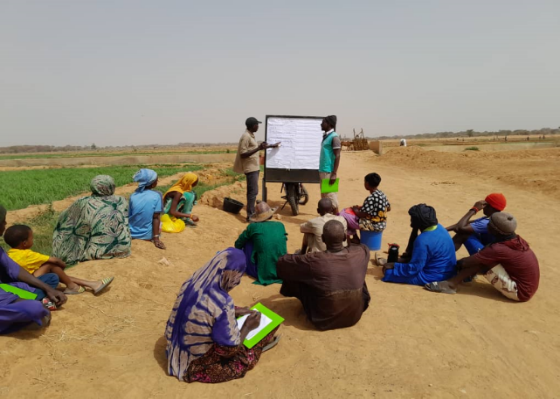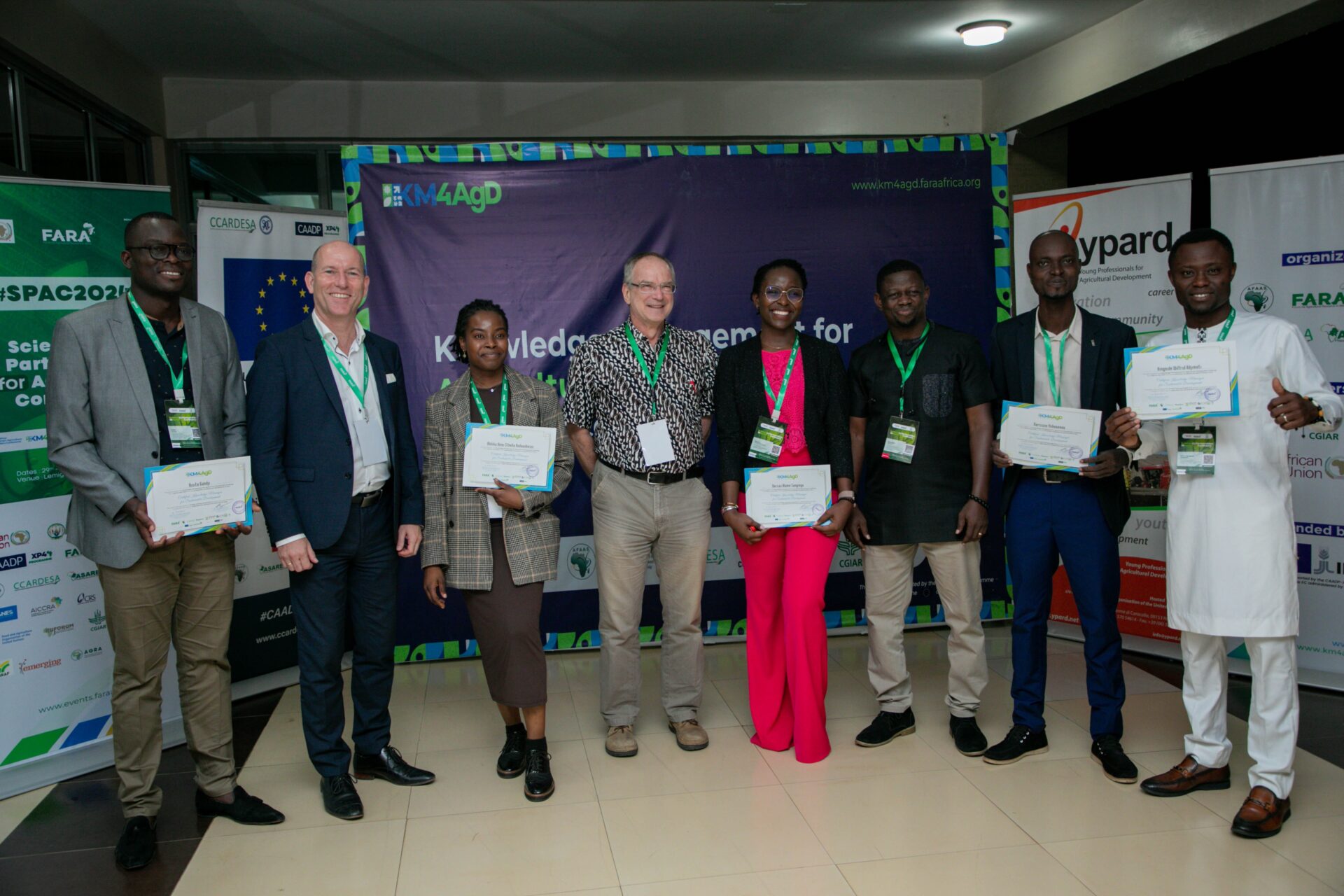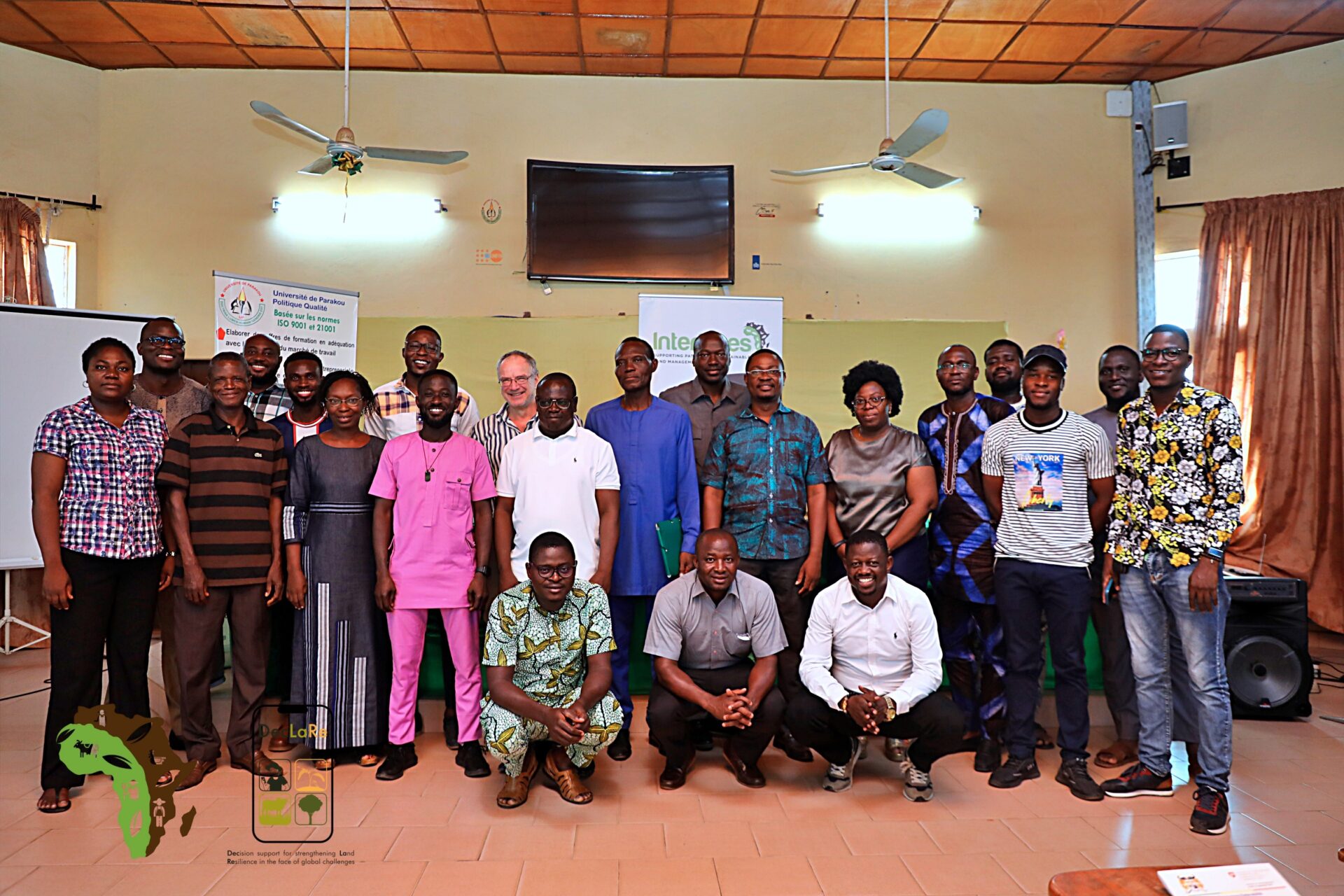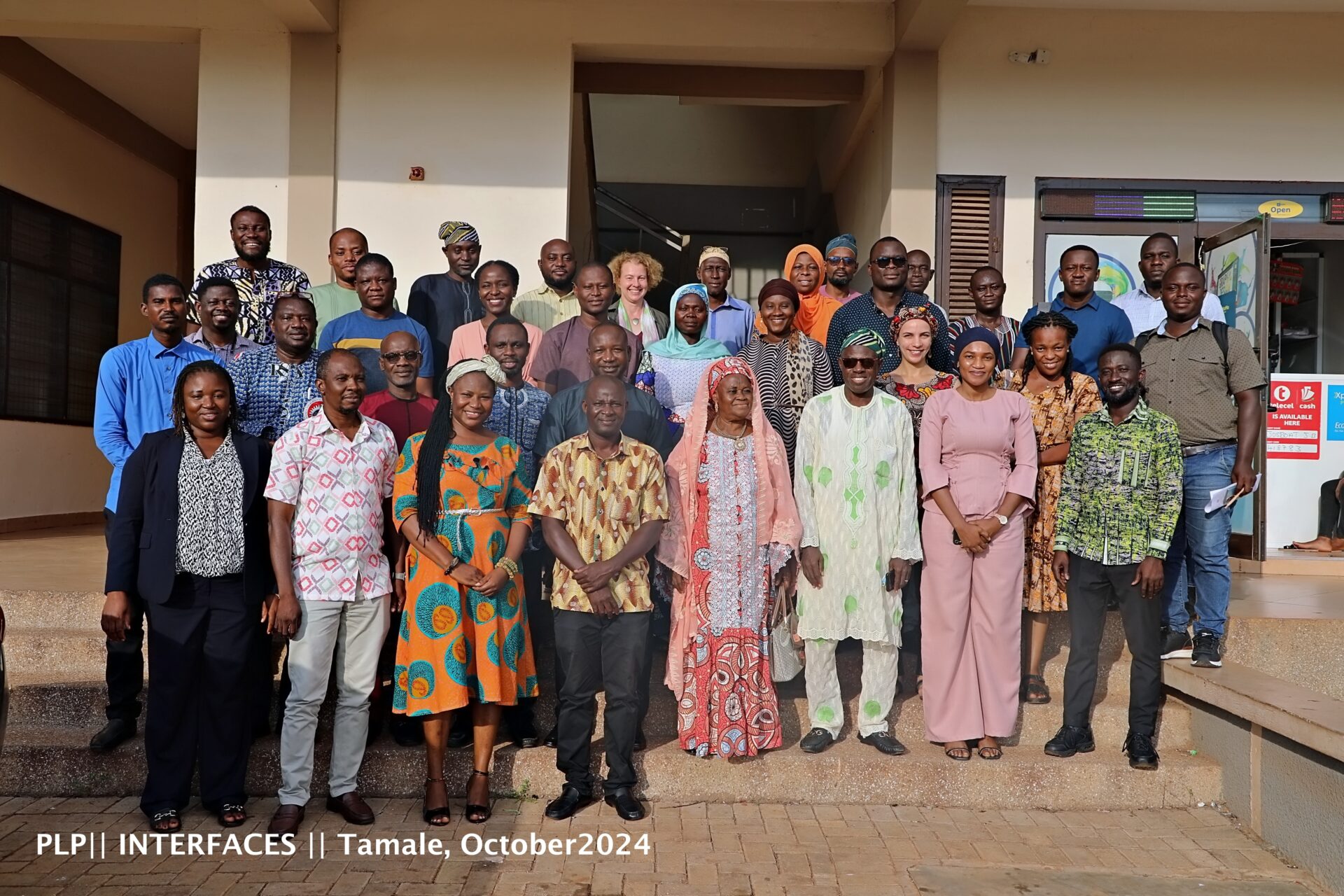All projects made considerable progress in their fieldwork throughout 2024, with many of them finalising fieldwork and shifting from data collection to community workshops, participatory learning platforms and implementing various mapping tools.
At the beginning of 2024, the COINS team traveled to Senegal to visit various stakeholders, collect cropping data and introduce a participatory mapping method. This was followed a few months later by a visit to northern Ghana with a large socio-economic survey conducted as well as a data collection protocol having been developed for biodiversity monitoring in Integrated Soil Fertility Management (ISFM) farms.
Also active in northern Ghana, the INTERFACES team established the Participatory Learning Platform and conducted three workshops to identify and develop outreach and upscale strategies as well as communication mechanisms, including one field trip to two communities.
The DecLaRe scholars sped up their progress and many of them finalised their fieldwork in 2024. For example, a pre-test of the M-Tool in northern Benin took place prior to the main data collection on mental models to evaluate the comprehensibility of the visual icons and their use-friendliness.
In the InfoRange project, community committees were established using the Net-Map approach to ensure inclusive participation. High-fidelity prototypes of the Rangeland and Vet apps were developed with continuous community feedback to ensure the app functionalities met the diverse needs of users. Furthermore, PhD and master students conducted field activities in Namibia and Kenya, focusing on assessing rangeland governance and herders’ information needs, mapping the disease reporting systems and identifying related challenges.
The students from Kara University and the Minodu project team continued their interdisciplinary work on the prototypes, which were developed as part of a hybrid university course. After a two-day co-creation session at Kara University’s FabLab, the group visited three communities in the Kara region to present and discuss the practicality of the prototypes with the communities and gather feedback. Several prototypes were proposed, including an irrigation system for drought periods, a natural plant extract for pest control, and a local community network for knowledge sharing. The entire team spent the following two days reflecting and analysing the visits as well as preparing for the upcoming fieldwork.
A wide range of education and capacity building activities took place for a multitude of project stakeholders, including not only PhD and master students as well as senior researchers but also community stakeholders as key target groups for all the projects.
The three PhD students from INTERFACES have carried out fieldwork in northern Ghana on gender-based violence and incentive systems for sustainable land management, and are currently analysing data. Two MSc students in Benin have finished their studies, following the innovations of COINS and DecLaRe, and a further two master students in Ghana are finalising their theses. Weekly seminars were held for the InfoRange PhD students to enhance interdisciplinary research skills, provide a platform for presenting results, and facilitate collaborative discussions on research plans and progress.
The development of the e-learning curriculum is making good progress with the certificate having been implemented with the University of Environment and Sustainable Development (UESD) in Somanya, Ghana and the establishment of the Moodle platform. DecLaRe participated in the e-certificate workshop organised by INTERFACES at UESD to discuss the courses development, online learning management system, online moderation, and timeline.
Two System of Rice Intensification (SRI) Farmers Field Schools (FFS) were established within the COINS projects for major producer organisations (Union de Galoya and UJAK) in the Senegal River Valley and a MOOC was developed to extend the FFS training model and promote SRI technology further.
In InfoRange, Voluntary Information Facilitators (VIFs) were hired, trained and equipped to address the bottleneck of information accessibility in target areas. Additionally, ICT literacy sessions were introduced to empower community committee members by enhancing their ability to use digital tools like smartphones and participate in WhatsApp groups.
In the Minodu project, eight students from Kara University specified their research in five-month mini-projects. They documented their work on a digital platform and produced mini-podcasts for the communities in the local language, Kabyè, and the official language, French. The students visited the communities several times for fieldwork on their projects. The mini-podcasts will be made available as knowledge modules on the local community network.
Furthermore, five young researchers from across the projects were sponsored by INTERFACES to participate in the FARA-led 2024 Knowledge Management for Agricultural Development (KM4AgD) Challenge becoming “Certified Knowledge Managers for Sustainable Development”.
Additionally a number of capacity building seminars and courses were offered such as communications and media trainings and the ongoing colloquium series.
As the accompanying project, INTERFACES organised several (side) events at international conferences in which the researchers from regional projects and funding agents participated. For example, a successful panel discussion was organised at the International Transdisciplinarity (ITD) Conference in Utrecht, the Netherlands, an event linked to the UNCCD’s 30th Anniversary was organised in Bonn, Germany, a pre-conference workshop was held at Tropentag in Vienna, Austria, and a side event was organised and livestreamed during the UNCCD COP16 in Riyadh, Saudi Arabia. Many of the regional projects further represented themselves, for example Minodu contributed an audio-visual exhibition at Tropentag; and IPAR, as part of the COINS project, sent a delegation to the UNCCD COP16. Additionally, PhD students were supported in presenting research at international conferences throughout the projects.
Furthermore, the Minodu project team participated at the re:publica in Berlin in May 2024 and held a workshop “Building Bridges: Soldering for Climate Change Awareness”, that allowed the participants to learn more about the different regions of Togo and how they are affected by the impacts of climate change. InfoRange organised a Technical Working Group (TWG) meeting, including representatives from organisations such as GIZ, KARLO, NNFU (Namibia National Farmers Union), VSF- Swiss, Herding4Hope and others, fostering transdisciplinary collaboration, integrating local knowledge and scientific research to co-design innovative digital tools like the Rangeland and Vet apps.
DecLaRe co-organised, with INTERFACES, a stakeholders’ workshop in Northern Benin to engage stakeholders on the project activities, and to co-develop a gender-responsive theory of change on sustainable land management to support of the project’s implementation in that area.
COINS additionally participated in the European Geoscience Union (EGU) international conference in Vienna, Austria and the Earth Observation for Africa (EO4Africa) Symposium organised by the European Space Agency (ESA) in Frascati, Italy.
The year 2024 also saw new publications from team members: “Good practices in funding transdisciplinary and participatory research for sustainable development in Africa. Learning lessons from German public funding programmes on sustainable land management and agricultural development in Africa” (IZNE Working Paper 24/2), by Eefje Aarnoudse, Tina Beuchelt, Berenice Fischer, Hannah Jaenicke, Wiltrud Terlau and “Improving innovation adoption among African smallholder farmers” (Rural21 01/24) by Theodore Asimeng. Also Peter Asare-Nuamah published two articles: “A call for action to protect agricultural lands” (Rural21 04/24) and “Incentivising African youth for agriculture and agribusiness” (Rural21 03/24). InfoRange PhD student Derrick Sentamu published a peer-reviewed article: “Stakeholder analysis and their roles in livestock disease reporting and response in northern Kenya” (Pastoralism: Research, Policy and Practice, Volume 14 – 2024).
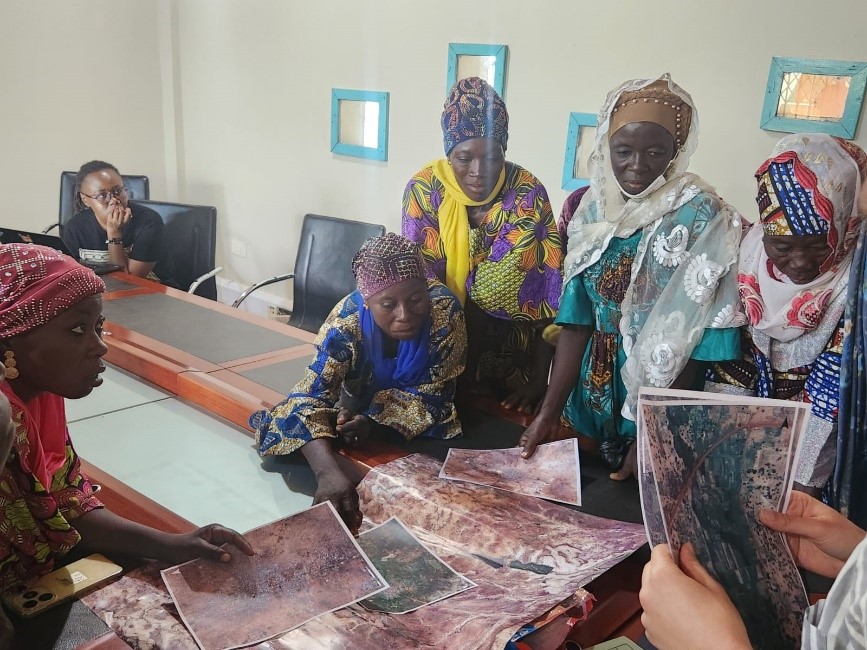
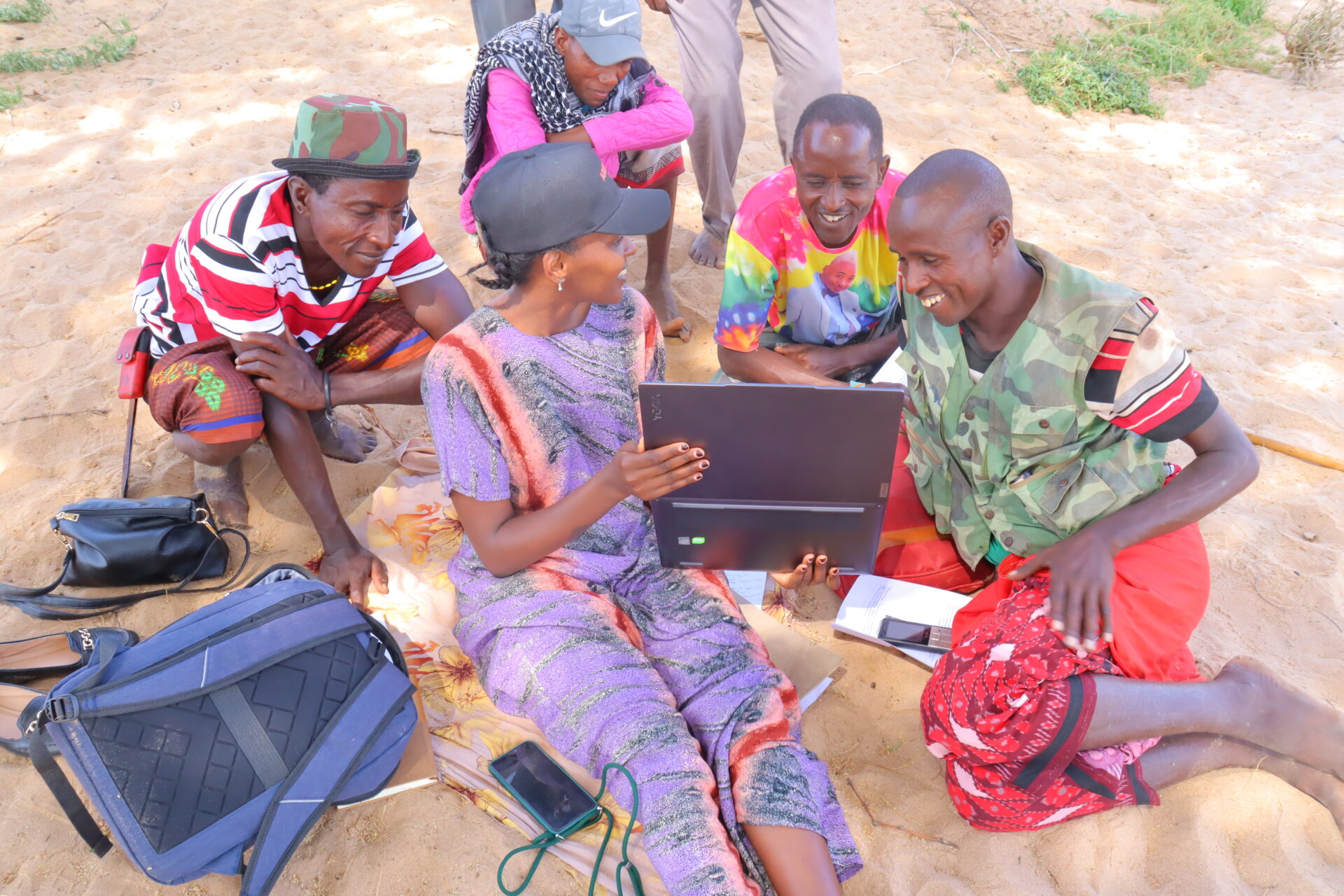
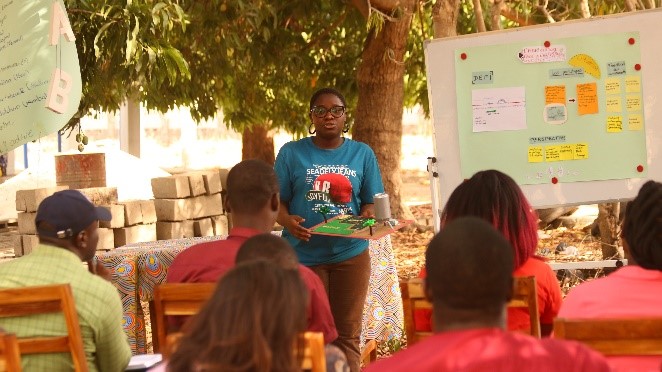
For INTERFACES the work on the Participatory Learning Platform is ongoing and activities following the innovations of COINS and DecLaRe, with plans to present these at several international conferences in 2025.
COINS will continue to take measurements of biodiversity and GHG emissions and develop an agricultural monitoring system using earth observation data. DecLaRe will complete all remaining fieldwork.
The Minodu team is eager to see an initial prototype of their local community network in action, with further co-creation sessions planned at Kara University and in the communities for the middle of the year. The results will then be used to further engage with the communities and co-develop approaches towards inclusive digital participation in rural areas.
InfoRange’s PhD and master students will conduct extensive field activities in Namibia and Kenya to explore additional needs of pastoral communities to further refine the apps and collect information for its knowledge repository; to co-develop rangeland-monitoring tools for critical grazing units; and to co-design workshops with local end users to refine the high-fidelity prototype.
Key work in 2025 will be the continuation of ongoing activities, data processing and analysis. Above all, the e-certificate will be launched.
INTERFACES will sponsor another round of young researchers in the KM4AgD Challenge. At DecLaRe a training will be conducted on the Carbon-Nitrogen analyser at the University of Development Studies (UDS) in Ghana.
The Minodu project will develop another online course that aims to help participants communicate their scientific results simply and appropriately so that they are also accessible for a non-academic audience, and look forward to developing further knowledge modules as audios an in further media formats for adaptation to climate change based on local knowledge.
Farmer Field Schools will be set up by COINS in Senegal and Ghana; community workshops will be held in Senegal; a Hackathon organised on the use of geospatial data and tools in agriculture in Tamale, Ghana; a business models for farmers to incentivize sustainable intensification in Agriculture will be developed; and finally incurrence solution will be set up for farmers to reduce climatic risks.
In 2025, the InfoRange students continue to benefit from the ongoing seminars for research skills and more community workshops will be organised to foster ICT literacy among livestock keepers and other primary stakeholders, using peer-assisted learning techniques.
With the funding measures for the consortium “Sustainable land management in sub-Saharan Africa: Improving livelihoods through local research” past its halfway point by 2025, publishing at conferences and in journals takes the spotlight.
In honour and celebration of the half way mark, and to foster knowledge exchange and networking within and between the individual projects, INTERFACES is organising a Status Seminar to be held in Accra, Ghana from 2 to 6 June 2025. Planning is well underway with colleagues from ZEF, IDOS and FARA taking care of the organisation. All projects have submitted exciting proposals to be presented in various innovative formats, including guided poster sessions, interactive workshops, and co-creative plenaries.
DecLaRe and InfoRange are additionally organising stakeholder workshops and technical working group meetings, respectively in continuation of ongoing networking and outreach activities.
Across all projects, PhD candidates and master students will continue to be supported to participate at international conferences and prepare peer reviewed articles. For instance a series of panels are being organised by INTERFACES at the European Conference on African Studies (ECAS) in Prague, Czech Republic in June, and another pre-conference workshop and technical session are planned for Tropentag 2025 in Bonn, Germany.
The blog series, a great success in 2024 with 15 contributions, will continue with project insights and developments in 2025. Also the briefing series, which was established in 2024, will pick up speed with contributions forthcoming by InfoRange on co-designing mobile-based digital solutions, a joint contribution by COINS and DecLaRe on micro-dosing fertilising, another one by DecLaRe on land suitability for crop production, and also a contribution by Minodu on community-based solution approaches.
The first publication has also already come through in January by colleagues from the INTERFACES project in the form of a ZEF Working Paper (239) on integrating gender in social learning approaches. Furthermore, InfoRange plans on developing and publishing a training manual for Voluntary Information Facilitators (VIFs) and to use the manual as a resource for training new VIFs and conducting refresher courses for existing facilitators.
Most recently, PhD candidate at INRES, University Bonn, Dorcas Sanginga Alame won the 2025 GFFA Science Slam with her heart-felt tale of “Equality” versus Equity”. The full video is available here, with Dorcas’ segment running from 38:00 to 49:50. Congratulations Dorcas on this wonderful recognition!
